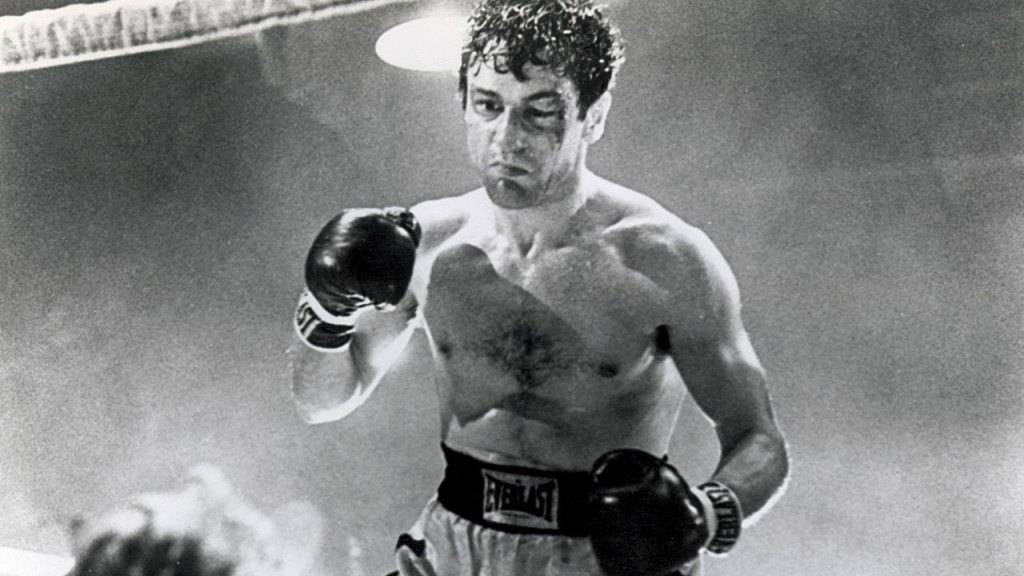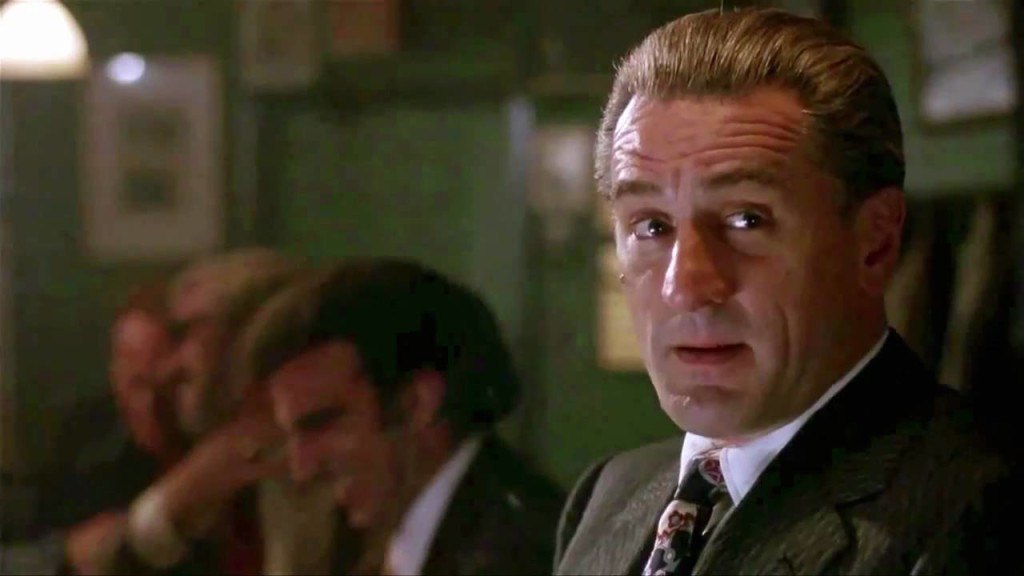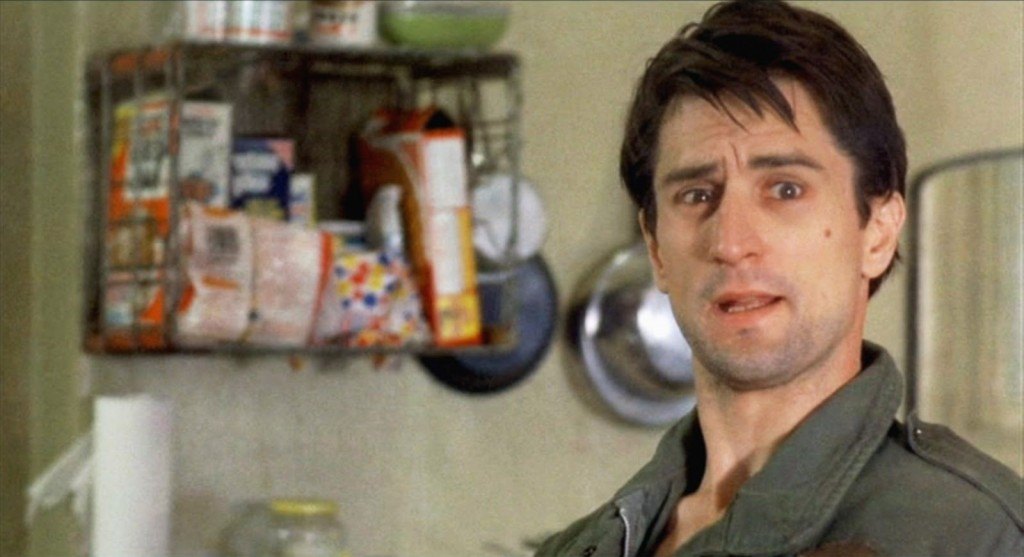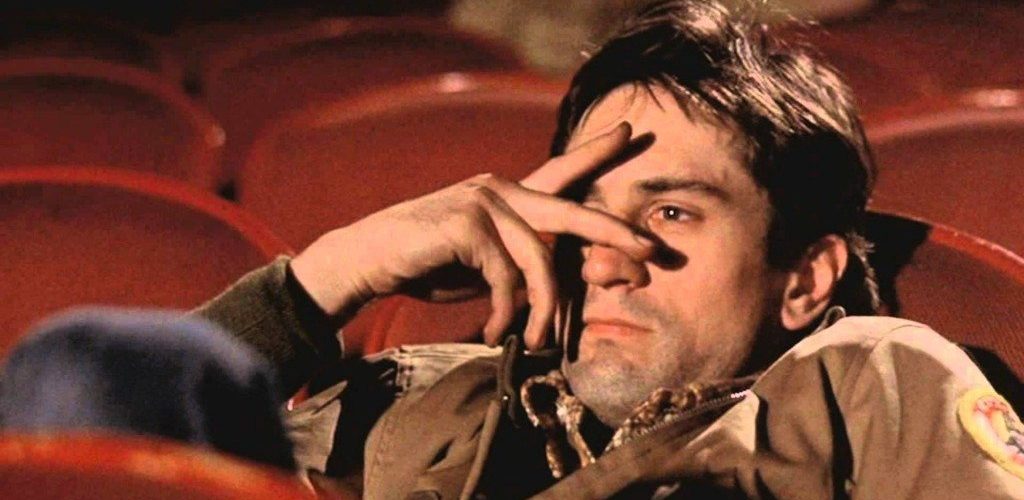Like Pacino, there once was a time when I looked forward to the films of Robert De Niro, but sadly, not for a long, long time now. When De Niro exploded into seventies cinema with Mean Streets (1973), won an Oscar for The Godfather Part II (1974), was simply searing in Taxi Driver (1976), stoic in The Deer Hunter (1978) and stunning in Raging Bull (1980) the comparisons were made to Brando and they were right. He was astounding in those films suggesting danger and menace without having to do a whole lot, though his work in Raging Bull (1980) is a magnificent physical performance, not to mention one of those remarkable performances in the history of the cinema. Had De Niro stopped acting after those films he would have still been considered one of the greats of all time, and though there have been some good performances since, he has never reached those lofty heights again. Ever. In fact, in the seventies in a short time he had four Academy Award nominations for his work, and since 1980 has been nominated just three times. Three times in thirty years whereas his first four came within six years. And the man has awful in a lot of awful films in that thirty years.
I suppose there were tell tale signs in the seventies that his range was not what we expected it might be. His performance in The Last Tycoon (1976) was oddly muted, he did not handle being a romantic lead very well, and he was a disaster in New York, New York (1977) opposite Liza Minnelli (who was marvelous), just totally out of his element.

But the eighties started with some promise. He had his Oscar for Raging Bull (1980) and made True Confessions (1981) with Robert Duvall, taking a supporting role to Duvall’s lead. The two were sensational together, earning excellent reviews, though not many people saw this excellent film noir. Next came The King of Comedy (1983) a darkly brilliant comedy which was too disturbing for audiences and critics of the time, though it is now considered a masterpiece and one of his best performances. He is frightening as Rupert Pupkin, the autograph nut who wants to be a star and goes to extraordinary lengths to achieve his fame.
De Niro gave one of his finest performances for director Sergio Leone in the extended cut of the gangster epic Once Upon a Time in America (1984). A masterful performance in which we see a volatile young man get tired of the violence and betrays his friends, only to become hunted and haunted by the films end, an old man forever looking over his shoulder. The studio butchered the film, taking it from its four hours down to ninety minutes, leaving it making no sense. In the full version, De Niro is Oscar worthy.
One would think the paring of De Niro and Meryl Streep as romantic leads would show some sparks, but Falling in Love (1984) was a dud of a film, not even the presence of the lovely Streep enough to lift it up. It was becoming clear De Niro did not work as a romantic leading man, nor was he particularly funny. But he was damned he was going to do a comedy and in 1988, after two great supporting performances in The Untouchables (1987) as Al Capone and Angel Heart (1987) as Lucifer, he made Midnight Run (1988) with Charles Grodin which was supposed to show his comedic side. It did not, though a wildly entertaining film, it merely had De Niro playing a bully, not unlike Jake Lamotta, to Grodins smart ass, most of the laughs went to Grodin.

He teamed with Scorsese again twice between 1990-1991, with spectacular results for both, Goodfellas (1990), arguably the finest film of that decade, and Cape Fear (1991) in which he was drop dead terrifying as Max Cady, hellbent on revenge. For that performance he received his final Oscar nod for Best Actor to date. The same year as Goodfellas (1990) he won the New York Film Critics Award for Best Actor for his powerful and sad performance in Awakenings (1990) portraying a man coming out of a coma after forty years and finding the world so very different, before slipping back into it.
The nineties seem to be where things began to fall apart for Den Niro, and I believe it was just excess, just too much De Niro on screen. More than ever, his weaknesses as an actor were showing with each bad performance. Now before I launch into the bad performances let me state emphatically, there were a handful of good ones such as This Boys Life (1993), Jackie Brown (1997), Cop Land (1997), his sissy pirate in Stardust (2007), Silver Linings Playbook (2012) and his cameo in American Hustle (2013), which suggested the danger and menace of the old De Niro is still there.
But when he was bad, he was stinking terrible. And he was bad often, too often for a great actor to be considered a great actor. We have never seen Nicholson, Streep, Hoffman, Penn, Depp, or Duvall so consistently terrible. Mistress (1991), The Fan (1993), The Adventures of Rocky and Bullwinkle (2000), oh God why…., 15 Minutes (2001), Showtime (2002) , Godsend (2004), Hide and Seek (2005), Righteous Kill (2005), Everybody’s Fine (2007), Machete (2010), Killer Elite (2011), Being Flynn (2012), New Years Eve (2012), The Big Wedding (2012), Last Vegas (2013), The Killing Season (2013) and a strange hybrid that attempted to cash in on Rocky fighting Jake LaMotta…sort of called Grudge Match (2013). And those are just the worst of the worst. There are others, his horrible work in the otherwise fine The Mission (1986) in which he looks so out of place, as Pacino did in Revolution (1985), the ‘Analyze This’ films, which just seem wrong, as do the ‘Meet the Parents’ films which seem to give otherwise good actors the chance to be wildly over the top and spoof their own image. Does playing a bully and maniac pass for comedy these days for De Niro….guess so, though he was very funny as the spoofy pirate in Stardust (2007)!

SO what happened along the way I wonder…I have a theory. Money. He was financing his Tribeca project, the festival he created in New York, the films he was making and producing quietly, often not taking a credit, and that takes cash, substantial amounts of cash. He often deferred his salary when directing, as in the excellent and under appreciated The Good Shepard (2007) and used some of his own money to get the film made. He needs money, copious amounts of money for his film work, his alimony and to support the people he supports. So it seems if there is a window to make a film, he will do it. It is clear he stopped looking at the scripts a long time ago and makes whatever comes along.
How else can one explain, please, The Adventures of Rocky and Bullwinkle (2000) or was his thinking that Nicholson had made off like a bandit making Batman (1989), Pacino had got an Oscar nod for Dick Tracy (1990) so why not do that sort of film…who knows what he was thinking. The fact is we do not think of De Niro like we used too and we do not think of De Niro in the same league as of Meryl Streep, or Jack Nicholson or even, Sean Penn. Like Pacino, he has tarnished that image, fallen off the pedestal we had him on, one which he deserved to be placed.
Looking back on his work in the seventies it is hard to believe it is the same actor. I watched Taxi Driver (1976) to prepare to write this, and was astonished again at the danger he projected just by moving his eyes, and was happy to see that same sort of danger in American Hustle (2013) as he sat around a table watchful for betrayal, so it is still there…I hope we see more great work from De Niro, as I believe he has it in him. But there is also a part of me that wishes my brain were like a computer and I could delete the bad performances, because they have forever colored what I think of him.
Finally, this is a companion piece to my Pacino article and I must say something about Heat (1995) the first film in which they have appeared onscreen together. They have a brief encounter on a roadside, and then a long sequence in a diner having coffee. De Niro steals it by being smart, by being subtle, by being quiet and projecting that calm, cool, dangerous demeanor. When challenged, the gifts are still there, but he is no longer challenged by the work or by the directors — David O. Russell being the only exception. What he needs more than anything is to make a film with Scorsese and get back to his roots…remember what he did that was great, and give it to us again.


You must be logged in to post a comment.